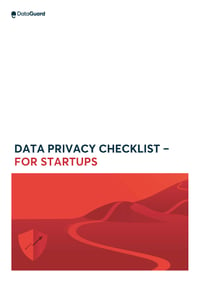Startups need to implement data privacy in all stages of growth. Here's everything you need to consider, including a checklist so you can ensure compliance.
What you need to know, in a nutshell:
- Even during the seed stage, founders must become familiar with data privacy.
- The early appointment of a data protection officer is advisable, regardless of your legal obligation to do so.
- To satisfy legal requirements, organisations must document work processes involving personal data.
- Organisations are required to set up IT systems that comply with data privacy laws.
- If you develop your products such as apps or online shops, you must follow the general “Privacy by Design” rule. “Privacy by Design” should be embedded into the development of products such as apps or online shops.
- Organisations need to add the right expertise to their international expansion teams due to new and complex data privacy challenges.
- Look for a data privacy service provider who can offer you the right knowledge in the different company phases. Select a data privacy expert who can provide the right knowledge throughout the different phases of company development.
In this article
- Data privacy for startups: General considerations
- Part 1: Data privacy in the founding stage
- Part 2: The company is prospering – the growth phase
- Part 3: Data privacy in the expansion phase
- Conclusion: As a whole, what does quality data privacy do for you?
- Bonus Download: Free Data Privacy Guide for SaaS Companies
Starting a company can be compared to a phase of youthful overconfidence: ideas are abundant and the strength to implement them is readily available. Therefore, it’s only natural that something as tedious as data privacy is pushed aside. However, neglecting data privacy in the foundation of a startup company can present repercussions. Here's everything you should consider.
Data privacy for startups: general considerations
As soon as personal data is collected, data privacy concerns affect new and small companies just as much as it does large and established ones. In most cases, every company involves customers, employees, service providers and suppliers. Therefore, business activity without data protection implication is unlikely.
To put it simply, all individuals involved in founding a company must observe the General Data Protection Regulation (GDPR) throughout the business lifecycle. Failure to fulfill GDPR requirements at the start of the lifecycle requires expensive adjustment processes which leads to large fines and, in extreme cases, jeopardises company operations.
Part 1: Data privacy in the founding stage
Planning: What aspects of data privacy must be considered before founding a company?
Startup companies must manage data in compliance with data privacy law, ideally early on in the seed stage. Founders of tech startups often carry a misconception that is enough to be compliant. However, the organisation must embed data privacy requirements into its processes.

Data Privacy Checklist for Startups
Wondering what steps startup companies should take towards data privacy? Download our data privacy checklist for startups to ensure compliance throughout all stages of growth.
Client acquisition: Are startups allowed to cold call?
As initial client acquisition plays a crucial role for most startups, many sales activities occur as early as possible. Cold calling is a desirable method for client acquisition and it is permitted, but companies must comply with data protection requirements. This means that sales representatives should not badger potential customers unreasonably when contacting them. In most cases, startups obtain explicit consent from the customer to collect personal data.
Data protection officer: Does my startup need one?
Startups will require a data protection officer if their core activities require large scale, regular and systematic monitoring of individuals or if sensitive data is processed.
The voluntary appointment of a DPO is always welcomed and considered the safest approach to this requirement. If there is doubt of whether a DPO must be appointed, the Information Commissioner's Office (ICO) has provided a short questionnaire to assist in this decision. However, requirements for this vary based on jurisdiction, so this method shouldn’t be conclusive of your decision.
What are the risks associated with the finance and healthcare sectors?
Startups need data privacy to avoid liability risks and fines. The early appointment of a data protection officer is a critical first step in monitoring internal processes that are subject to GDPR compliance.
Imagine two scenarios: 1) a healthcare startup loses its patients' details and 2) customer accounts and financial information from a Fintech company are stolen. Both examples of compromised access to sensitive data can cause adverse outcomes to its owners. In this instance, data protection officers can provide meaningful guidance on how to mitigate the risks presented by these scenarios.
Part 2: the company is prospering – the growth phase
What data privacy requirements are implicated with company growth?
A growing organisation must consider the following:
- Employee and applicant data: When creating or processing new data associated with an employee or applicant, organisations must sufficiently protect sensitive information. Personal data of departed employees are also subject to the GDPR and must be erased upon termination. The same goes for the data of rejected applicants.
- The appointment of a data protection officer is obligatory for most companies processing personal data on a regular basis. As a company, you have two options here: you can appoint an internal employee, or you can make use of an external specialist.
- In addition to company growth stages all successive processes relevant to data protection must be structured and documented. An experienced DPO can assist.
Can wrinkles from the founding stage still be ironed out?
According to the data privacy principles, “Privacy by Design” and “Privacy by Default”, a company must embed data privacy options into the design of a product and in its default settings. This is because technical aspects of data privacy can be challenging to implement once a product goes live.
For example, a startup company and its developers created a prototype app prior to the founding stage. During early development, the creators of the app neglected to consider data privacy stipulations.
Let's assume now that the company is in its growth stage with its prototype as the core marketable product. The company’s founders will need to consider if the product should be improved or redeveloped due to its privacy issue. This means that companies need to ensure full adherence to data privacy guidelines before thinking of designing a product.
Other data protection issues from the startup phase concern the technical and organisational measures within the company. For example, the local storage of personal data on a PC or laptop may make it impossible to delete them in conformity with data protection regulations, which may lead to a data protection violation. In this case, a scrutinising look through the data protection glasses is indispensable.
Part 3: data privacy in the expansion phase
What do startups need to consider during international expansion?
Digital companies looking to expand into international markets after starting successfully domestically must also adhere to data privacy laws. In addition to extending its GDPR requirements to a new market, companies must also adhere to the local regulations. This results in complicated legal questions, and internal expertise is often not enough.
When transferring data to third countries, new companies are also subject to the same obligations as established international corporations. For example, if a startup expands into a third country, they also need to provide contractual clauses relating to data privacy for their subsidiary companies.
Data hosting can quickly become a significant cost driver with a growing user base. Major cloud service providers around the world have lower prices and are more attractive than those located in the EU. However, GDPR sets strict requirements for the storage of personal data outside the EU.
What happens if serious errors become apparent at this stage?
Data privacy becomes a concern when startups contact external investors or major clients. The startup must be able to demonstrate its GDPR compliance clearly and comprehensively to all parties. If gaps and negligence become evident, contracts are often delayed by tedious and expensive amendments, leaving the business operations in static.
For example, a large and established company in the healthcare or chemical sector is seeking to expand its innovative power into new markets and client segments. In this case, if the company must acquire a startup, the collection of customer data plays a pivotal role.
The company acquiring the startup would then be assessed for data privacy compliance. However, if a data subject’s details are not collected and processed in accordance with GDPR, they can no longer be used by the prospective buyer. As a large company, there are inherently more risks of legal violations related to the startup, causing liability and subject to fines/ sanctions. For the startup to pass the due diligence test, it must comply with data protection law from the very start.
What opportunities does data privacy offer to founders?
Data privacy negligence leads to incalculable risks for companies. If a high level of data privacy is implemented from the start, there will be strategic advantages:
- Today, customers expect proper and transparent handling of their data. Good data privacy can therefore be used as a marketing argument.
- When collaborating with large companies, a good review of data privacy will ensure lots of trust, and even an increase in revenue.
- In terms of company acquisitions and the entry of investors, data privacy can be an obstacle and lead to delays.
Conclusion: How does good data privacy benefit startups?
New companies may see data privacy as a major hurdle. However, when startups manage to implement a comprehensive level of data privacy, the benefits will become extremely clear later on. Well-implemented GDPR conformity prevents risks and opens doors for customers, partners and investors.
Data privacy expertise is thereby required in all stages of company development. The seed stage mainly calls for technical data privacy in the form of secure IT and a product design that takes data privacy into account. Later, the advice given is adjusted to the company’s individual processes. Good data privacy service providers help startups implement data privacy – in all stages on the road to success. Explore DataGuard's tailored privacy solutions for startups, ensuring compliance and data security through every stage of growth.
There are still some questions that you would like to get answered? Feel free to reach out to one of our experts. Schedule a free consultation today:








